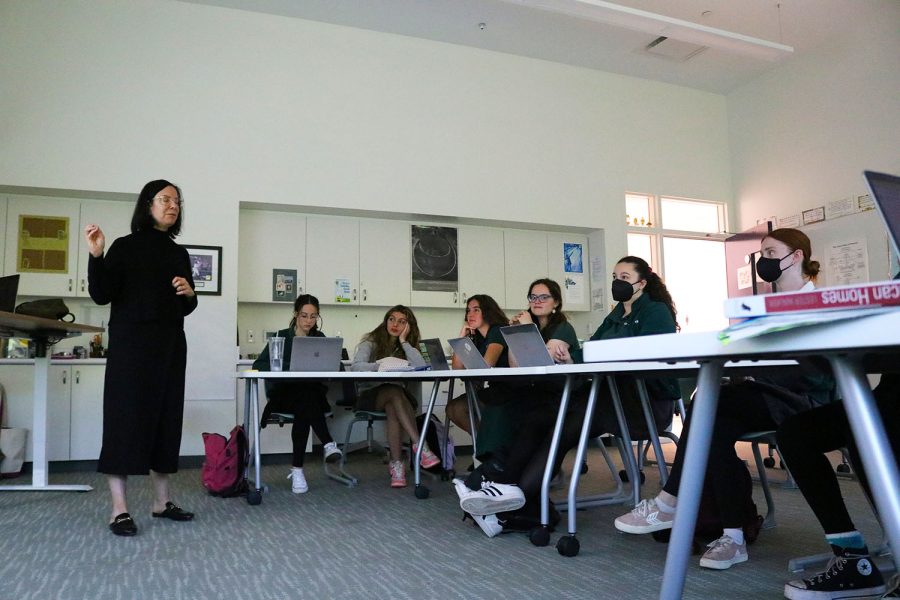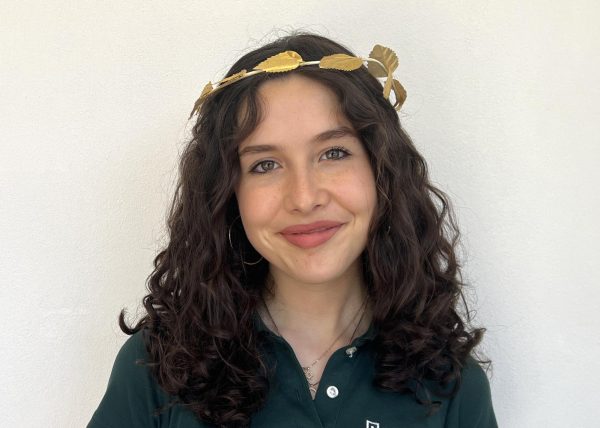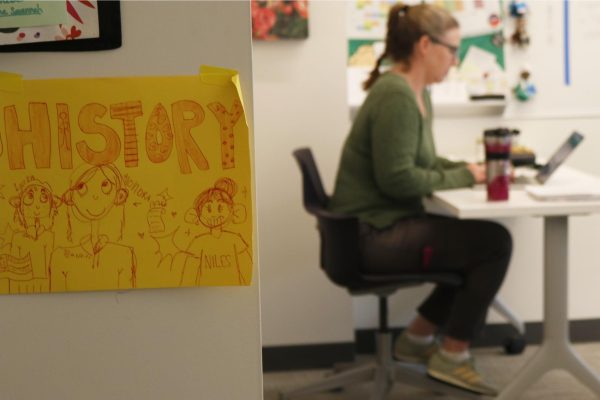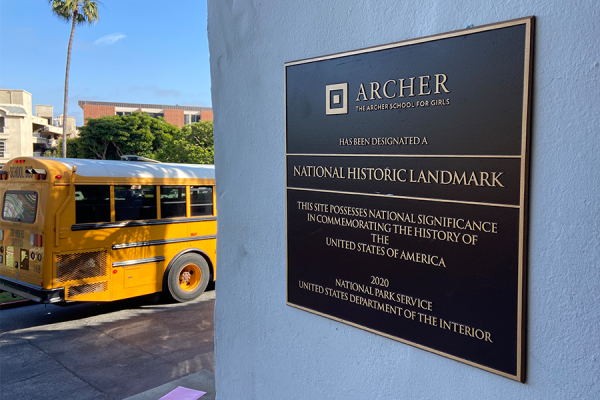Building blocks of connection: Head of School teaches senior seminar about architecture
Photo credit: Lucy Williams
Head of School Elizabeth English teaches the origins of visual design elements in her seminar American History through Architecture. She said teaching has made her more connected to the class of 2023 and faculty.
October 31, 2022
Being an Archer senior comes with the opportunity to choose from a larger catalog of high-level courses beyond the standard “four core” classes. Archer offers 11 humanities seminars taking students back to the future, pondering the afterlife and politically debating with peers across the country. This year, 10 Archer seniors walked into a history seminar and were greeted by their Head of School Elizabeth English and her golden retriever Alfie.
English teaches a new one semester course called American History through Architecture during the E block of the schedule rotation. She is covering the narrative of architecture in the United States, which dates back to the settlements of indigenous people. Students analyze historical buildings from around the country and dive into the architects’ design choices. Currently, she is focusing on architecture in 17th century New England.
“The students will leave knowing how to read a building by understanding what components, ornamentation, structure, materials and location tell us about the society in which the building exists,” English said. “American architecture is like a kaleidoscope; you couldn’t scratch the surface in a year.”
The class references a textbook when analyzing buildings. Senior Penelope Bisley said aside from citing the textbook, English doesn’t assign any worksheets or closed note tests. Class discussions go beyond examining historical architecture by exploring geographical components and modern culture. They ponder the architect’s choices from a personal point of view.
“We talk about real-world situations, like ‘If you were to build a house, where do you put the windows?’” Bisley said. “It’s not just learning about history, which personally isn’t my favorite, but we ask, ‘Why would you do this because of the climate, or in Los Angeles versus New England?’”
English is trained as an English teacher, but she has a passion for architecture and interior design. She taught this course at every independent and private school she has worked at, debuting it 34 years ago as an intern at Emma Willard school in New York. It was the beginning of her teaching career. As a former dancer, in her first four years at Archer, she choreographed for the Night of Dance.
“[English] definitely has a different way of teaching than most teachers,” Bisley said. “She has a curriculum, but we go as the class goes. She doesn’t like to lecture us, so we’ll end up ranting about something for ages, and then she’ll add a project. She wants us to learn, not overwork us.”
To prepare for the seminar, English enrolled in Archer’s new teacher institute alongside incoming Archer teachers. The new teacher trainings are led by expert instructor and English teacher Wendy Deming. A tenant of the program is that knowing how to teach is more important than knowing the content.
“I understand how to cause learning. If they don’t do well on the quiz, that’s my fault,” English said. “You can’t ever say ‘I taught the material’ if the students didn’t learn it. You weren’t effective as a teacher.”
I understand how to cause learning. If they don’t do well on the quiz, that’s my fault. You can’t ever say ‘I taught the material’ if the students didn’t learn it. You weren’t effective as a teacher.
— Elizabeth English, Head of School
English said in order to teach her students, she wants them to cultivate a genuine interest in architecture. She leads explorative discussions rather than following a set curriculum, and she asks her students what they are most interested in learning in order to customize the path the class goes down.
“It’s important to have classes that you get excited about where there’s a personal agency,” English said. “I ask the students if they want to go deeper on a topic. I’m not marching through a curriculum. I want to know what they’re most interested in studying. If it’s Spanish colonial revival, we’ll spend more time on that.”
Various students expressed that, previously, there was a disconnect between the students and the head of school, and English said this was due to her duties in her leading role. She said being in the classroom has made her feel more connected to the class of 2023 than any other senior class since her daughter Sage’s class, who graduated from Archer in 2015. She also bonded with new Archer teachers when she attended the new teachers’ institute.
“I was really close to Sage’s class because they were always at my house,” English said. “Every single student in that class had slept over at least once. That’s not a way that I can connect anymore. We came back from COVID feeling there are a lot of big things that we have to get done here: money to be raised, a building to be built, a strategic plan to be executed. But the best part of school is the students. I’m missing out on that because of my responsibilities, but I don’t have to.”



















Nicole Williams • Nov 12, 2022 at 3:24 am
What a great read, Lucy! You packed a lot in this story and made it flow beautifully. Nice work!